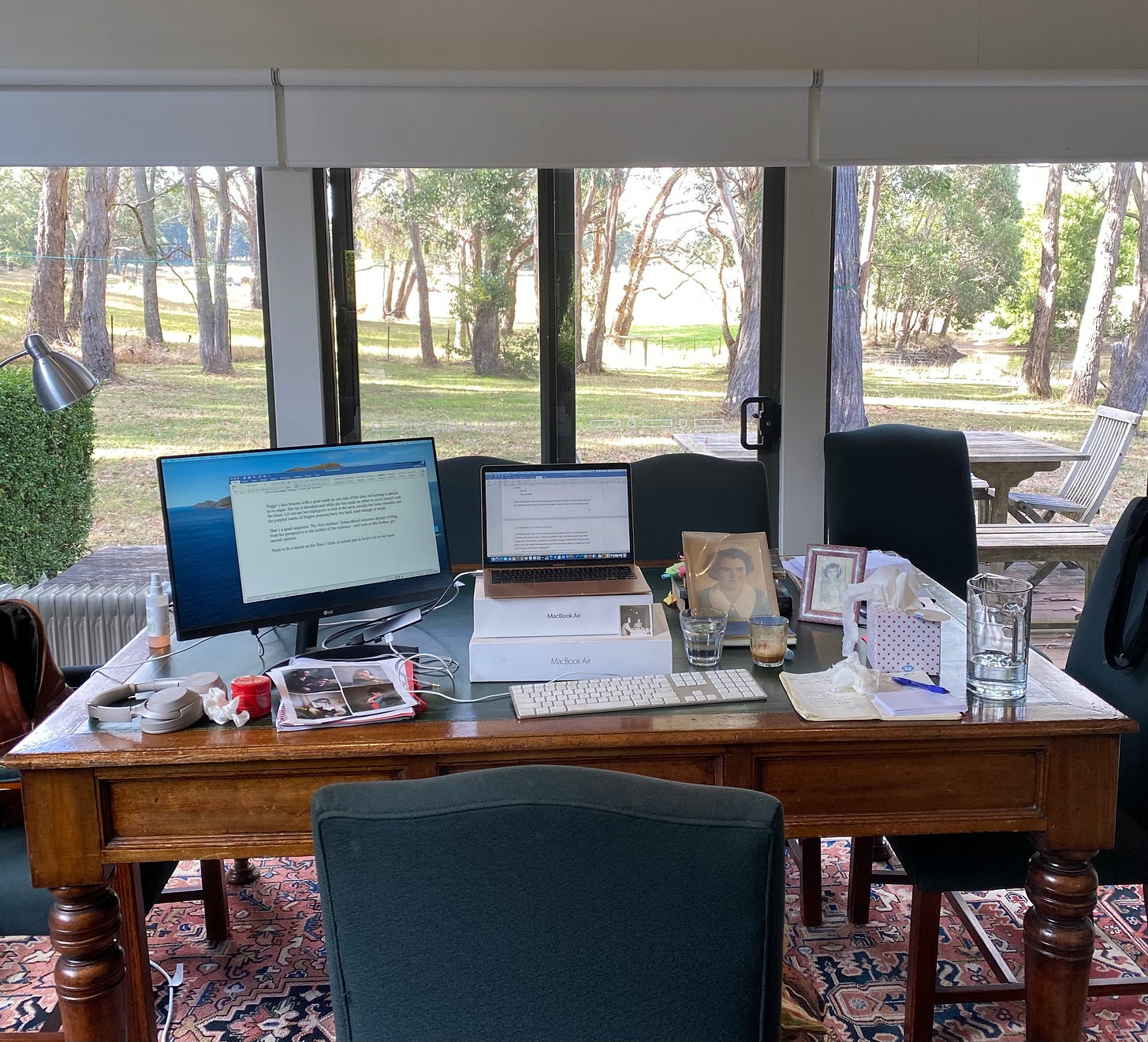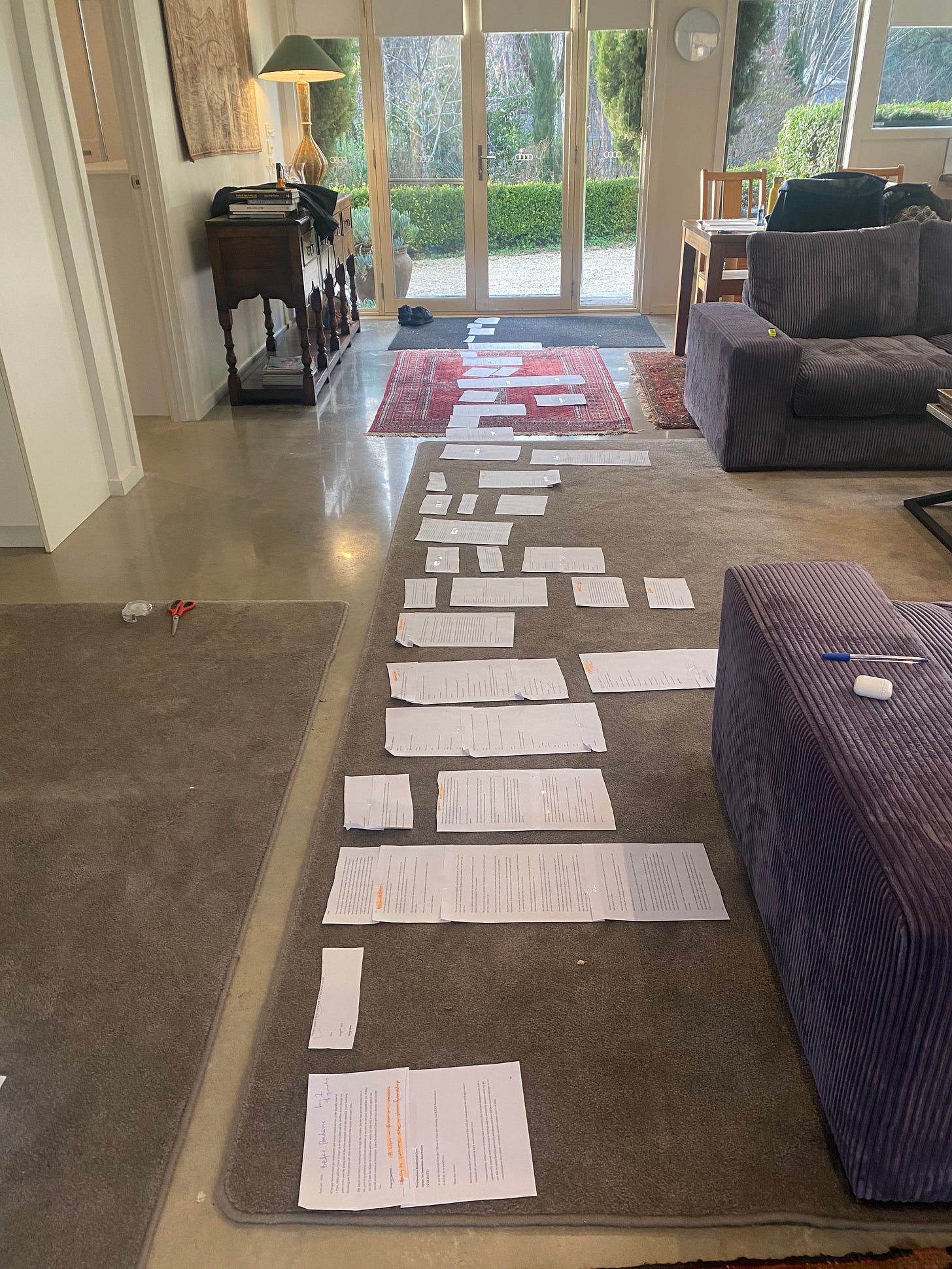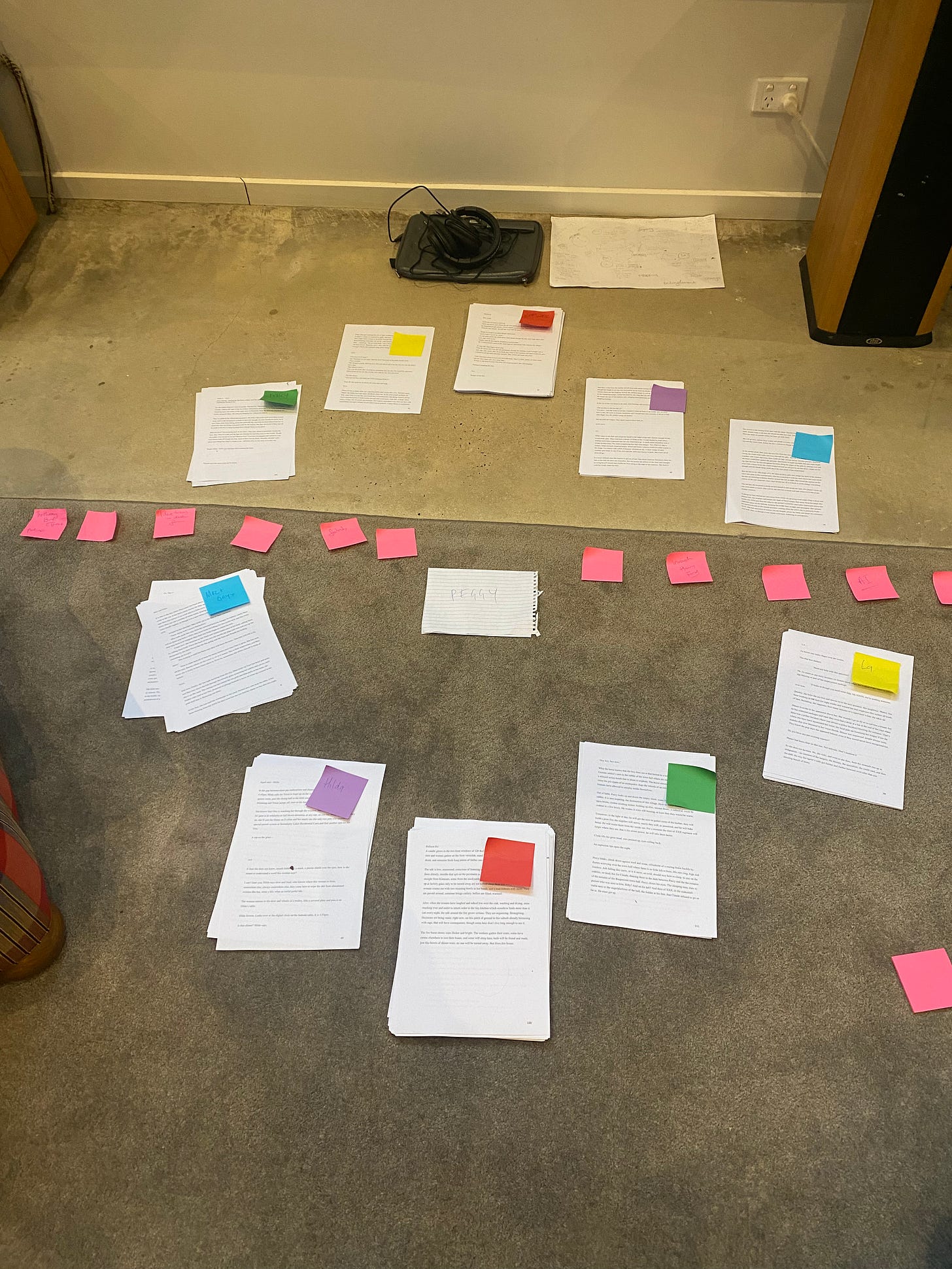Hello dear readers. Before I get into the nitty-gritty of writing residencies, a quick book update! It’s now only two months until my new novel The Hummingbird Effect hits shelves and I’m 8 parts excitement, 2 parts wobbly. The amazing team at Simon & Schuster, including cover designer Josh Durham and digital whizz Brad Graham, are responsible for this glorious cover reveal.
In the lead up, I’m doing a little series - Behind the Book - on my insta, where’ll I share some pics and thoughts on some of the research and process. Very soon, we’ll be releasing tour dates and venues and you’ll be able to book tickets to come along to some bookish chats I’m REALLY excited about. You are VERY welcome to pre-order the book at your preferred retailer, whether that’s via the publisher page, or by chatting to your local indie bookstore. If you’re a book store owner or would like to know if I’m visiting your area, you’re welcome to get in touch by leaving a comment here or via my instagram.
Right. Onward. So how did I get this book (and my previous ones!) written? In part because I regularly ‘run away’ from home to writing retreats where I get a huge amount of work done. Let’s acknowledge my privilege in being able to do that: I’m supported (in part financially and in all ways logistically) by a partner who can pick up extra home-duties when I’m away and as a FT writer/PhD candidate I’m more flexible in able to take ‘time-off’ paid and other work than those who are employed by others. I’ve also got a supportive 'village’ of family and friends who can ferry kids about. I’m a previously published writer which means some residencies (invited or funded) are more available to me.
I used to think that writing retreats had to be bestowed upon me by the powers that be; but over time I’ve realised that I can also grant them to myself and access them online.

What a writing retreat involves for me:
Time and space (although this can be at home) to focus on a writing project (including reading, dreaming, napping, thinking, walking AND actual writing)
Preparation to ensure I’m as ‘offline’ as possible (including from school notices, email, socials, family and friends message threads as much as possible)
Pre-prepared or easy food and writing snacks
Coffee (so much so that I once included my coffee machine in the boot when I drove to Bundanon)
Table and chair at the right height to avoid frozen writer neck
Accountability - to myself or others which may involve making a plan for what I want to achieve, checking in with other writers on goals, deadlines, 5pm drinks and debrief if I’m sharing the residency with others
An ideal writing retreat day
Early morning:
Coffee and first words. I rarely get this at home because I use the kids’ pre-get up time for exercise so I love having time to put those post-dream thoughts onto the page.
Walk/run/stretch/explore followed by breakfast.
Morning session:
Always my most productive. I set myself a to do list the night before and get granular ie.
9-10am finish scene in Hilda’s room
10-11am go over structure of Peggy’s story
11-11.30am check research points re Women’s Weekly 1933 headlines
Crossing things off the list gives me my dopamine hit and keeps me on track.
Lunch:
Good, grounding food (writing is exhausting) often followed by reading I’ve brought along and/or a nap. NAPPING IS IMPORTANT. Working intensively on a project is often emotionally draining and using precious residency hours to nap is a totally legitimate use of time.
Afternoon session:
More off the to-do list. Sometimes i’ll have completely changed direction after the morning session (or the nap!), also okay! The gift of uninterrupted time with your project is that you can afford to go down rabbit holes, veer off course and return and allow yourself time for play. This is why I reckon I always have such huge breakthroughs when I’m away working - I’m more in tune with the project.
Structural play (aka using the floor and walls!). Index cards, highlighters, post-it notes, big paper and floor space (or walls and blu-tac) are always in my packing list because I often use residency time to try and see ‘the whole’ of my project and what’s working or not. If I’m at a finished draft point I’ll bring the printed draft along and often cut it up or section it out in parts and move things around.
Late afternoon:
I try and set a finish time (5pm if I’m away with my incredible RMIT PWE gang at Musk) and leave at least 30 mins before that to list out what i’ve got done and set my intentions for the following day. I do all this in my unwieldy word doc journal (which I’ve written about for Lee Kofman’s blog here) so it has the added benefit that I can always go back and check where I made big shifts if I need to follow the bread crumb trail back through draft.
Knock off drink/walk/stretch.
Evening:
If I’m with other writing folks we generally debrief on what we’ve got done/plan to do over dinner and drinks.
On my own, it’s down time! Often I’ll have planned some kind of relevant-ish tv or film to watch, or I’ll dive into the pile of books I’ve usually brought.
The true gift or a writing residency for anyone who has caring duties is SLEEP and I generally crash pretty early ready and look forward to solutions for project problems magically appearing in my dreams (doesn’t happen all that often, but WAY more likely when I’m away from home!)
So - where, how and when?
I’ve been lucky to have received residencies to some wonderful places I’ve applied to: Varuna and Bundanon in the past, and Michael King Writer’s Centre in Aotearoa for this book. Other Australian residencies include KSP Writers Centre, Jacky Winter and Hedberg. It’s incredible to get these opportunities, but they are often competitive and thus hard to incorporate your work plan around.
Each year my writers group book in our own writing retreat at a property we love and that fits us all. We try and book these in advance - some for 4 nights, one for a week - and we share meals. We’ve nailed our own ‘Varuna-type’ rules and each either work in our own room or in common spaces if we feel like company. The advantage of this system (and I know LOTS of other writers groups do this) is that we can book the place and time that suits us all and we are not reliant on ‘winning’ a residency spot.
Sometimes, I run away on my own, particularly if a writer-mate or someone I know has a housesit opportunity! In return for dog/cat sitting I get time and space to write - it’s a total win/win! (Enormous thanks to you Andrea Rowe, Else Fitzgerald, my dear friend, Tess and my mum and dad, for giving me these opps during the writing of The Hummingbird Effect!) Let your mates know you’re keen for housesitting or put the call out via your networks!
Last year I was lucky to be part of novellab through RMIT University, through which we received Creative Vic funding for a self-led retreat which we took in two blocks at two different locations. Going for funding as a group can be a good option for writers. Being part of RMIT - as a student and now PhD candidate has also led to being invited to be a resident at McCraith House. I’ll be chatting to other past McCraith house residents - André Dao and Keshe Chow at The Wheeler Centre on Aug 2 about the impact of writing residencies if you’re keen to get along.
I’m also a HUGE fan of the Word Cave - an online writing retreat and workshop run by the phenomenal US writer, Sarah Sentilles. I’ve taken part in this numerous times and will continue to do so! The online aspect means that it’s more accessible (and logistically possible) and both the writing prompts and support from Sarah and the collaboration with other attendees always makes these Word Caves incredibly useful for my project.
My wishlist
I recently chatted to an Australian writer who’d done an eye-watering number of International writing residencies and it got me thinking about my dream retreats - those ones you imagine that ONE DAY (when life responsibilities and the stars align) you might fly away to. Here’s my incomplete wish list:
Hedgebrook: a rural residency for women writers on Whidby Island
Library of Water: artist’s residency in Iceland
Keesing Studio: AusCo funded at the Cité internationale des arts in Paris
BR Whiting Studio: AusCo funded in Rome
Chateau d'Orquevaux: because French Chateau
The Arctic Circle: tall ship expeditionary residency for artists and scientists, Arctic Circle
Antarctica Arts Fellowship: THE DREAM
Final thoughts
It is SO tempting (she says as she scrolls those international residencies!) to set your sights on the big-gun residencies with funding and prestige - but you can also validate yourself as a writer and make your own retreat: by blocking out time from normal work and life and setting your own ‘retreat rules’, by checking out online options, or by combining with writer friends or using your own networks for housesitting/writing retreat combos or swaps.
Whichever way you do it - pack the writing socks and your favourite snacks and prepare to move forward with your project and have at least a couple of naps.
Do share your own writing retreat experiences, suggestions, tips or questions in the comments!
K xx







Hi Kate, are there residencies for people who are not published writers?
This is wonderful. Thank you. Have you written any blogs on how you manage to be effective while still navigating the insanity that is life insitu?